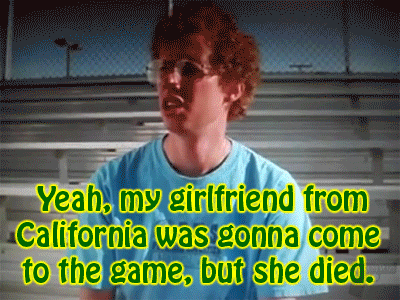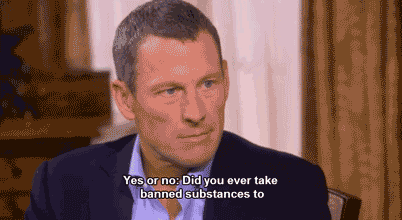We all make mistakes, and I’d like to think we all apologize when we’re in the wrong. Fortunately, not many people notice when I make a mistake – but when newsmakers such as Lance Armstrong, Manti Te’o, Anthony Weiner or a CEO of a major corporation make a blunder, the whole world pays attention.
The reputation of an organization or a celebrity is an intangible asset, but it’s an extremely important and valuable one. Many CEOs, actors and sports stars face a crisis situation with the potential to seriously damage their good reputations. When in this situation, a public apology is often the beginning of the road to redemption – whether through a statement, a press conference or an appearance on Oprah or Katie Couric’s television show.
 This hoax was perfect for Internet comedians – this GIF was one of many out there.
This hoax was perfect for Internet comedians – this GIF was one of many out there.
I thought about writing this post when I read that the alleged “mastermind” of the “dead girlfriend hoax” of Notre Dame linebacker Manti Te’o – Ronaiah Tuiasosopo was going to tell his side of the story this week. Te’o has already scheduled an interview with Katie Couric. In a sermon last Sunday, Tuiasosopo’s father, a pastor at Oasis Christian Church, told his congregation that he was learning to say “No comment” in 20 languages!
With my crisis training at Schroder PR, the first thing I thought was – that’s the last thing he should say! Maybe 20 years ago, “no comment” was the advisable go-to response for responding to hard-hitting questions, but not anymore. The world has changed. When the public reads that phrase now, it assumes the party is guilty and being evasive.
I do think it’s smart that the whole Tuiasosopo family is planning to meet to figure out when and how to tell Manti’s “side” of the hoax story. They should get the complete story gathered in an understandable narrative and then decide who is going to be the family spokesperson. Whoever is behind the hoax, “No comment” isn’t going to pass muster with the public and the media – both of which feel duped. Tuiasosopo isn’t well known, or even a little known, and he and his family are already under the media spotlight. It will be very interesting to see how they plan on responding – and hopefully apologizing.
Another recent fiasco in the news is Lance Armstrong speaking about his use of performance-enhancing drugs. He sat down with Oprah (who else) and addressed the doping scandal, years of accusations of cheating and the drugs throughout his career.
 Lance apologized on the show – and that’s worth something right? An apology to all those he inspired, competed against and beat probably came to welcome ears. Throughout the first night’s interview, Armstrong appeared “defiant, distant, difficult” and “arrogant, unaware, flippant.” He obviously had a coach – and the plan was to appear open and honest. If you saw the interview, you could tell it was rehearsed, until he apparently went off script on the second night.
Lance apologized on the show – and that’s worth something right? An apology to all those he inspired, competed against and beat probably came to welcome ears. Throughout the first night’s interview, Armstrong appeared “defiant, distant, difficult” and “arrogant, unaware, flippant.” He obviously had a coach – and the plan was to appear open and honest. If you saw the interview, you could tell it was rehearsed, until he apparently went off script on the second night.
On some level, Armstrong seemed to understand that he had to make a perfunctory admission – but that’s all he gave. In my opinion, a person who is genuinely sorry doesn’t say they looked up the definition of the word “cheat” and then declares he doesn’t think he meets that definition.
Another interesting part of the interview was Armstrong referring to himself in third person. He seemed to be trying to distance himself by calling himself “Lance Armstrong,” and trying to separate “that part of my life” from “this part of my life.” Given his celebrity, we all expected him to be media-trained, but I can imagine his PR team wasn’t thrilled with the way he appeared on camera. Even with the best team and the most media training – you can’t prevent someone who has no remorse from giving a fake apology and diminishing his or her brand.
There may not be just one way to publicly apologize, but we definitely have witnessed a lot of examples of what not to do. In giving an apology, choosing the appropriate venue or outlet is important. Armstrong could’ve conducted his first interview since being stripped of his titles with anyone – but he chose Oprah, assumedly because he thought it would be the best chance for an image revival.
CEOs have internal and external audiences – including investors, employees, customers, competitors and media – to worry about. Waffle House CEO Joe Rogers Jr. recently came under public scrutiny when he was accused of sexual harassment. He managed it remarkably well, telling his employees about the scandal before it broke in the media. In his apologies to the media, he spoke of the pain and embarrassment he’d caused his wife and family – showing sympathy for others, not himself. He accepted wrongdoing, although he denied any sexual misconduct.
Once a press conference, television appearance or other event is scheduled, it’s important to prepare an open and transparent apology. Showing respect for victims and accepting blame should be a perfectly human response, but demonstrating genuine action that corrects any wrongdoing would be divine.
Sarah Funderburk


Leave A Comment